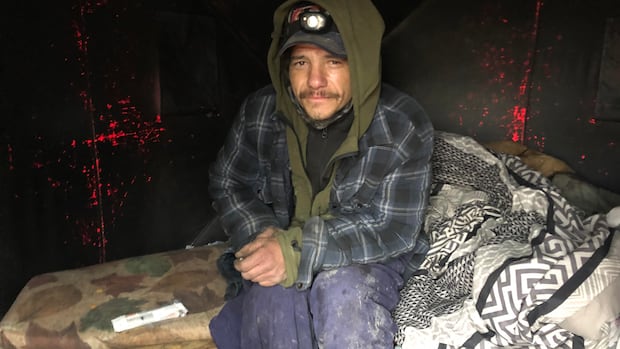Manitoba needs to ensure people struggling with addiction can move seamlessly through stages of treatment so they don’t “become lost to the system,” a Manitoba judge says after an inquest into a man’s drug overdose death at a homeless encampment.Lee Earnshaw, 42, was found unresponsive inside his tent, set up along the banks of the Seine River in Winnipeg, in June 2021.Earnshaw died of an accidental drug overdose after taking a toxic mix of fentanyl and methamphetamine, called gold down, the office of Manitoba’s chief medical examiner previously said.An inquest into his death was ordered in January 2022.Between March and May of this year, Manitoba provincial court Associate Chief Judge Tracey Lord heard testimony from community service providers and medical personnel who came into contact with Earnshaw in Winnipeg.Earnshaw’s family members attended the inquest hearings daily and continue to grieve his loss, Lord said in her 43-page inquest report, released Friday. Earnshaw worked as a commercial fisherman in British Columbia, where he lived with his wife and three children, said Lord’s report.He was initially prescribed opioid medication after sustaining a serious injury to his hand while fishing.”What began as a medical intervention to manage pain gradually turned into opioid dependence and eventually a struggle with opioid addiction,” the judge wrote.Earnshaw moved to the town of Grand Rapids, in Manitoba’s Interlake, in 2017 to distance himself from a readily available supply of drugs, Lord’s report says. He eventually moved to Winnipeg, where he became homeless over time as he battled an opioid addiction.Weeks before he died, Earnshaw told CBC News he was seeking help for his addiction. Earnshaw said he had been turned away from a rapid access to addictions medicine, or RAAM, clinic twice in the city in recent weeks.”There was some issue, I had used [drugs] within 24 hours or something,” Earnshaw told CBC in April 2021. “It’s kind of disappointing because you psych yourself up, you’re ready to go.”That eagerness to find addiction treatment, met with a struggle to do so, is something those working in the field often see, according to Lord.Lack of connection, co-ordinationAn outreach worker with St. Boniface Street Links testified that he took Earnshaw to a RAAM clinic at least three times, one of which was successful, and to detox twice with no success, Lord wrote.People at the Winnipeg organization who met with Earnshaw “shared the view that he sincerely wanted help, but was so deeply entrenched in opioid use he was simply unable to become prepared for treatment,” Lord wrote.A “seamless transition” is needed so that people who are ready for recovery can access a treatment bed, the judge wrote.Witnesses at the inquest hearings said there is a lack of connection and co-ordination between various organizations in Manitoba that offer continuing and interconnected phases of addiction recovery, Lord said.”In the transition from one phase to the next, individuals often relapse, lose motivation or simply fall out of communication,” Lord wrote.Employees with the outreach non-profit Main Street Project told the inquest they need more intake staff to keep in contact with people on their waitlist, including those who are homeless.Some people wait days or weeks to access a detox bed after “crossing the hurdle” of being medically cleared for detox by a physician, Lord wrote, leading to the challenge of fighting an addiction without a change in environment.Multiphase facilities should be created throughout the province, in which “all addiction-related services are located together to address the gaps in time and physical location in which individuals become lost to the system,” Lord wrote.Judge recommends more detox bedsLord’s recommendations include increasing the number of RAAM clinics operating in Manitoba to reflect the growing need for treatment, with expanded operating hours and days.She also recommended incentives for medical school students who specialize in addiction treatment, and for primary care physicians to include opioid replacement therapy in their regular practice, which could reduce pressure on RAAM clinics, Lord said.Manitoba Health should provide coverage for opioid replacement therapy, as many people who go to RAAM clinics may not be able to pay for it, wrote Lord.She called for an increase in detox beds and residential addiction treatment spots, noting northern Manitobans, many of whom are Indigenous, must travel to Winnipeg for treatment. Increasing their access to addictions treatment would provide them with the same level of care offered in other parts of the province, and would also reduce pressure on those services in Winnipeg, wrote Lord.Noting that treating addiction can be a lifelong process, Lord also recommended addiction service providers boost their community outreach to help people who are preparing for, going through or have finished addiction treatment.”Without continued support, those who return to the circumstances that may have given rise to the addiction are less likely to be successful in recovery,” the judge wrote.’1 size does not fit all’The inquest was called after “an abrupt and dramatic increase” of opioid-related deaths in 2020 and 2021, Lord wrote.She suggested that addiction treatment models be expanded from focusing on bed-based treatment to other models where people are supported in the community, which would include long-term and community-based aftercare.The nature of the addictions many Manitobans face has “changed substantially” in recent years, and models used to treat addiction to substances like alcohol may not be relevant to opioids, Lord said. “With sufficient support, many may be able to remain in the community with their families and continue employment, particularly given the long-term nature of treatment required to treat opioid addiction,” the judge wrote. “One size does not fit all.”It’s unclear whether one or a combination of the recommendations would have prevented Earnshaw’s death, but Lord concluded by saying she hopes they “will increase the likelihood that someone in Mr. Earnshaw’s circumstances will meet with success when they ask for help.”
Friday, 6 Feb 2026
Canada – The Illusion
Search
Have an existing account?
Sign In
© 2022 Foxiz News Network. Ruby Design Company. All Rights Reserved.
You May also Like
- More News:
- history
- Standing Bear Network
- John Gonzalez
- ᐊᔭᐦᑊ ayahp — It happened
- Creation
- Beneath the Water
- Olympic gold medal
- Jim Thorpe
- type O blood
- the bringer of life
- Raven
- Wás’agi
- NoiseCat
- 'Sugarcane'
- The rivers still sing
- ᑲᓂᐸᐏᐟ ᒪᐢᑿ
- ᐅᑳᐤ okâw — We remember
- ᐊᓂᓈᐯᐃᐧᐣ aninâpêwin — Truth
- This is what it means to be human.
- Nokoma











